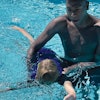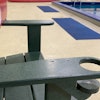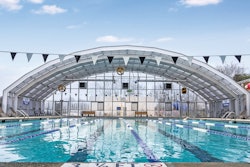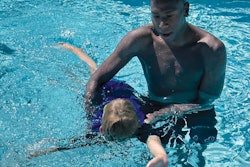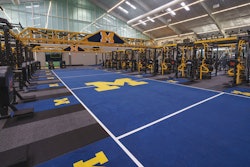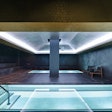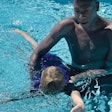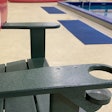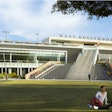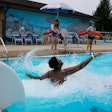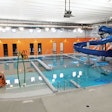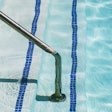All Rights Reserved
Copyright 2017 The Arizona Daily Star. All Rights Reserved.
Arizona Daily Star (Tucson)
More than 30 people were caught trespassing at the UA's Hillenbrand Aquatic Center over a recent 18-month period, resulting in arrests, fines and sometimes code-of-conduct violations.
From April 2016 through October 2017, University of Arizona police cited 33 people for trespassing when officers were alerted by motion detectors at the pool complex.
With several pools, a hot tub, trampolines for diving practice and a diving platform, the facility is a desirable target for the dozens of trespassers who climb a 10-foot-tall iron gate surrounding the center.
"It's happening often enough that we had to make sure there is an alarm system," said aquatics director Martin Tuck, who said the fence was installed before he arrived in 2010.
Despite the arrests, Tuck said many trespassers still get away.
"UAPD just doesn't catch them a lot," he said. "They're taking care of other business on campus."
During the same time period, UAPD responded to 22 additional calls in which no trespassers were located.
UAPD spokeswoman Sgt. Cindy Spasoff said most of the calls were just "false alarms" that were set off by cats or the wind.
In four cases, police responded to the center and found wet footprints in the area, but were unable to find the trespassers, according to police reports.
Despite the multiple false alarms, campus police always search the area for trespassers, Spasoff said.
"It's usually on the weekends," Tuck said. "The majority are university students, but sometimes it's also high school students."
Most of the break-ins happen between midnight and 4 a.m., and Tuck is alerted when the alarm goes off, resulting in many sleepless nights.
"From a selfish standpoint, I just want my sleep, you know what I mean?" he said. "And of course I don't want anyone to die or get injured. That's what keeps me up."
Trespassers face a number of dangers, and Tuck says he has legitimate concerns that someone will get seriously injured.
"Individuals come into the swimming pool under the influence," he said. "Maybe they want to come in and swim. They get a double-dog dare: 'You can't swim 50 meters underwater.'"
Six years ago, James Rigg, a former member of the Arizona State University swim team, snuck into an ASU pool, the Phoenix New Times reported. He and another student had a contest to see which of them could swim farthest under water, according to the New Times.
Both had been drinking, and Rigg held his breath for too long and drowned, the New Times reported.
"He was an experienced swimmer, too," Tuck said. "There's always a possibility of that happening here."
UA interim diving coach Samantha Pickens added that jumping from the high dive is extremely dangerous, even for experienced divers.
"The high dive is a 10-meter platform, which is three stories high," she said. "Even our best athletes need a lot of experience before they're confident enough to jump from it with the proper form, let alone trespassers who have been drinking."
Bruising of the entire body, ruptured eardrums, coughing up blood and concussions are possible for people who don't know how to dive from that height, Pickens said.
"Plus the lights aren't on when Hillenbrand is closed," she said. "You wouldn't have any awareness of where the water is, so that definitely makes it even more dangerous."
The high dive is accessed through a building that's locked at night, and pigeon spikes line the sides of the balcony at possible access points.
Several spikes were lying on the platform when the Star went to visit the aquatic center.
"Trespassers removed those last night," Tuck said. "Since the platforms are locked at night, you'd have to scale this building to get access to the high dive."
To remove the pigeon spikes, the trespassers would have had to punch or kick them to detach them from the balcony, but Tuck said the risk of injury concerns him more than the damage .
"If you're under the influence, you fall from the building trying to scale it, you jump from the high dive, you land wrong and you hurt yourself, a fatality is a possibility," he said.
Tuck usually comes to the aquatic center following break-ins to take note of any damage or safety hazards for the UA swimming and diving teams.
"I try to come in before the center opens when these break-ins occur," Tuck said. "I don't want anyone walking on deck without shoes and there's broken beer bottles or something questionable in the pool. That has happened."
Trespassers who are caught are responsible for paying for any damage.
"Some individuals were jumping on the trampolines used for practicing diving," Tuck said. "Their belt cut the trampoline. Those trampoline beds are not typical trampoline beds -- they're extremely expensive."
The trespassers responsible paid to replace the $4,000 trampoline beds.
In addition, the pools and hot tub often need to be sanitized following break-ins, according to Tuck.
"If they poop in the pool, we have to raise the chlorine to a certain level depending on the pool," he said. "They might also throw shampoo or fizzies into the pool. The cost for that could be anywhere between $200 and $500."
Tuck can only speculate as to why so many people trespass at the center.
"I would assume it has something to do with a college 'bucket list,' as I've heard that before," he said. "But your guess is as good as mine."
One such UA bucket list on a website included "go skinny dipping in the swimming and diving pool," and "jump off the high dive in the swimming and diving pool," as some of the adventures students wanted to experience before graduating.
On Aug. 27 at 3 a.m., the alarm system at the aquatic center had once again detected movement, according to UAPD reports.
Officers followed their usual protocol by surrounding the aquatic center on all four sides . An officer entered the unlit pool area and found three college seniors at the high dive.
They were dripping from having jumped into the Kasser Family Pool, designed for swimming and diving meets, and were detained without incident.
They told police jumping into the pool is on their "senior college bucket list," and officers forwarded code-of-conduct violations to the dean of students.
The students were cited and released for trespassing in the second degree, a Class 2 misdemeanor that carries a maximum penalty of four months jail time and a $750 fine, on top of the cost of any damage .
One trespasser told the Star he broke into the center to jump on the trampoline, not to swim or damage property. He had to appear in court, where he paid court fees and a separate fee of about $110 to the UA to have the charges dismissed, he said. The graduate student spoke to the Star on the condition of anonymity.
Read More of Today's AB Headlines
Subscribe to Our Daily E-Newsletter
Terms and Conditions Privacy Policy










